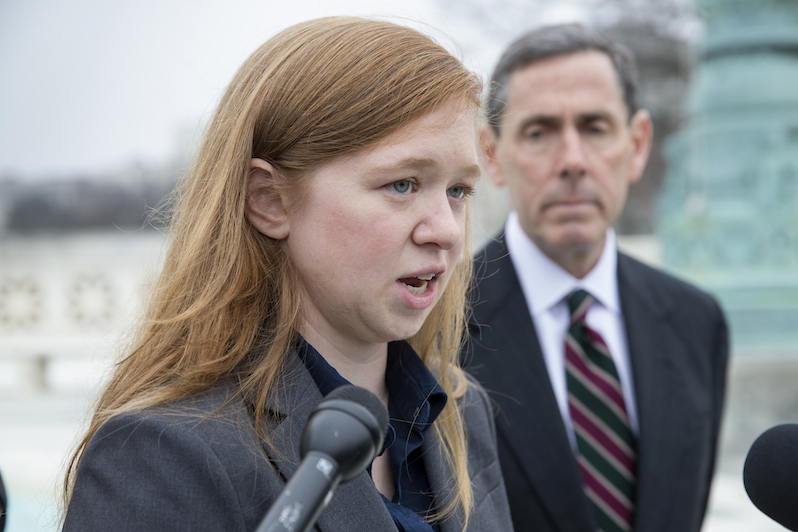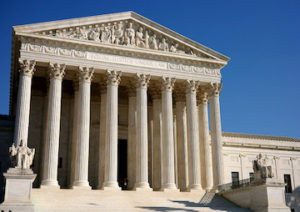The Supreme Court on Affirmative Action: 5 Possible Outcomes
If onetime University of Texas aspirant Abigail Fisher prevails on all of her claims, the last tepid vestiges of race-conscious affirmative action will end at public colleges and universities throughout the land. Abigail Fisher, who challenged the use of race in college admissions, speaks to reporters outside the Supreme Court in Washington on Wednesday. With her is Edward Blum, who helped bring the case to court. (J. Scott Applewhite / AP)
1
2
Abigail Fisher, who challenged the use of race in college admissions, speaks to reporters outside the Supreme Court in Washington on Wednesday. With her is Edward Blum, who helped bring the case to court. (J. Scott Applewhite / AP)
1
2
Back in Austin, the search for the right plaintiff to take on UT’s holistic admissions program dragged on until March 2008, when Blum received a phone call from an old friend and business associate—accountant Richard Fisher—who reported that his 18-year-old daughter Abigail’s heart had been broken after she had received a rejection notice from UT.
The two men discussed Abigail’s situation. She had finished in the top 12 percent of her high school class at Sugar Land, Texas, 20 miles southwest of Houston, just missing the automatic cutoff. She had compiled a 3.59 GPA and scored a respectable 1180 on her SAT exam. In addition, she had played cello in the school orchestra, was active in math club and the soccer team, and had done volunteer work with Habitat for Humanity.
Blum concluded that Abigail and another young woman who similarly had been denied UT admission—Rachel Michalewicz—would make ideal plaintiffs. With Donors Trust bankrolling him, Blum retained attorney Rein to file a federal lawsuit.
The suit failed at the district court level and was unanimously denied by the 5th Circuit Court of Appeals. Michalewicz withdrew from the litigation in 2011. But despite these setbacks, Blum and Rein appealed to the Supreme Court, which agreed to hear their petition.
Although the Grutter case was still the controlling legal precedent, Blum and Rein knew that the Supreme Court, under the leadership of Chief Justice John Roberts, was no fan of affirmative action or anti-discrimination legislation generally. Indeed, one month after the court heard oral arguments on the Fisher case in October 2012, it decided to review another lawsuit orchestrated by Blum and Rein—Shelby County v. Holder—dealing with the Voting Rights Act of 1965. In June 2013, the court in that case gutted a key provision of the Voting Rights Act, with Roberts writing for a 5-4 majority that racial discrimination in elections was largely an evil of the past. During the oral arguments held in the case three months earlier, Justice Antonin Scalia famously railed against the entire Voting Rights Act as an unconstitutional “racial entitlement.”
Blum’s hopes for a comparable outcome in Fisher, however, were dashed when the court handed down a 7-1 opinion, authored by Justice Anthony Kennedy, that remanded the appeal back to the 5th Circuit. Kennedy’s opinion ordered the 5th Circuit to reconsider UT’s holistic policy under the exacting “strict scrutiny” standard that is used to test laws and governmental practices that discriminate on the basis of race. To pass the test, a challenged statute or policy must be deemed necessary to accomplish a compelling state interest, and there must be no less restrictive alternatives to the law or policy under consideration that could further such interest.
After the 5th Circuit again upheld the Texas program in July 2014, finding that the university’s consideration of race was needed to further the compelling interest in campus diversity, the Supreme Court again agreed to consider Fisher’s suit.
Judging from the transcript of the oral arguments on Wednesday, the court is split 5-3 along party lines against affirmative action. With Justice Elena Kagan recusing herself because of her past involvement with the case as solicitor general during President Obama’s first term, the Texas plan appears to be on life support.
Midway through the 90-minute proceeding, Scalia appeared, once more, to lose what remains of his withering judicial temperament, remarking: “There are those who contend that it does not benefit African-Americans to … get them into the University of Texas where they do not do well, as opposed to having them go to a less advanced school, a … slower-track school where they do well. One of the briefs pointed out that most of the black scientists in this country don’t come from schools like the University of Texas. They come from lesser schools where they do not feel that they are being pushed too hard in classes that are too fast for them.”
Avoiding such an overtly racist perspective, Chief Justice Roberts posed a pointed follow-up question about the value of diversity, asking rhetorically, “What unique perspective does a minority student bring to a physics class?”
Justice Samuel Alito raised concerns with the evidentiary record that had been compiled in the case, while Justice Clarence Thomas remained mum, as he invariably does during oral arguments. Both, however, are staunch critics of affirmative action. Thomas, the court’s lone African-American, authored a separate concurring opinion in the court’s 2013 Fisher decision, contending that a state’s use of race in higher education should be categorically prohibited by the Equal Protection Clause of the 14th Amendment.
Given the court’s divisions, the task of drafting the panel’s majority opinion is likely to fall to Justice Kennedy, who will have at least five technical options:
First, and least probable, Kennedy and the court could dismiss Fisher’s appeal as moot, since Fisher graduated from Louisiana State University in 2012 and has sustained no real lasting injury, financial or otherwise, from the denial of her UT application. According to her LinkedIn profile, Fisher is currently employed in Houston as a marketing business analyst.
Second, and also unlikely, Kennedy could uphold the Texas plan as constitutional and find that Fisher’s application was fairly evaluated, and that she was rejected not because of her race but because her achievements just didn’t measure up to UT’s stringent standards. As Rutgers University law professor Elsie Bodie noted in a recent New York Times op-ed, the same year Fisher was rejected, UT also denied admission to 168 black and Latino applicants whose academic and personal profiles resulted in scores as high or higher than Fisher’s.
Hedging against the prospect of a loss, the dogged Blum has funded two other affirmative action cases—against Harvard and the University of North Carolina, respectively. Both complaints are pending at the federal district court level.
A third possible outcome is that Kennedy could remand the case a second time to the lower courts for an evidentiary hearing, following Alito’s line of questioning. But such an order would please neither side in the case, and would only prolong the legal battle.
The remaining two possibilities are more ominous. The court could either strike down the Texas plan on narrow grounds that would not extend to other state systems, or it could finally yield to the Scalia-Thomas view that all forms of race-conscious affirmative action in higher education are unconstitutional. If it chooses the latter course, it’s conceivable—though I wouldn’t bet on it—that either Scalia or Thomas could be assigned to draft the majority opinion.
This is, plainly, the great fear of progressive educators, regardless of which justice gets to pen the decision. In 2014, in Schuette v. Coalition to Defend Affirmative Action, the court upheld a voter-adopted amendment to Michigan’s Constitution that prohibits state universities from considering race as part of their admissions process. To date, seven other states, including California, have implemented similar bans.
In the Fisher case, should the court rule that states that favor race-conscious affirmative action no longer may exercise that option, the effects will be profound, especially at the nation’s most selective colleges and universities. Numerous studies have shown that bans on affirmative action lead to fewer minority admissions. Even race-neutral programs that take socio-economic disadvantages into account cannot take up the slack.
America remains a racist society. Participants in the Black Lives Matter and new student movements know this. Sadly, Chief Justice Roberts and his Republican brethren apparently don’t.
Your support matters…
SUPPORT TRUTHDIG
Independent journalism is under threat and overshadowed by heavily funded mainstream media.
You can help level the playing field. Become a member.
Your tax-deductible contribution keeps us digging beneath the headlines to give you thought-provoking, investigative reporting and analysis that unearths what's really happening- without compromise.
Give today to support our courageous, independent journalists.




You need to be a supporter to comment.
There are currently no responses to this article.
Be the first to respond.